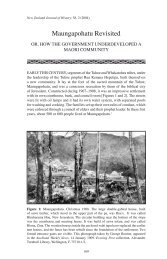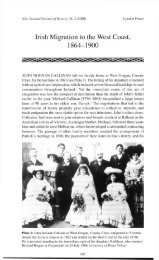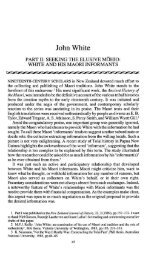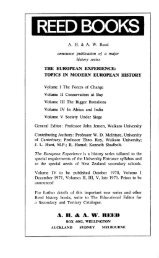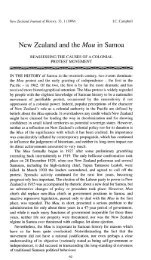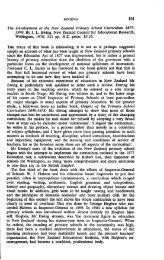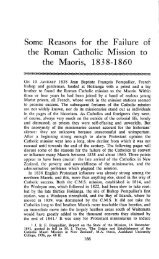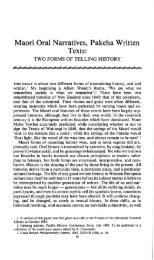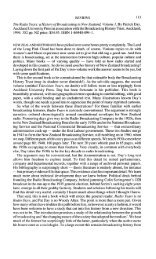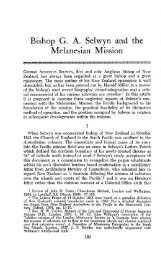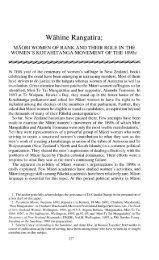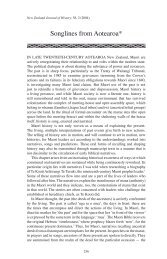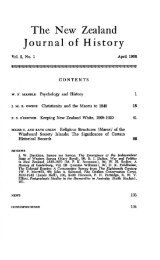Friendly Societies 1842-1938 - New Zealand Journal of History ...
Friendly Societies 1842-1938 - New Zealand Journal of History ...
Friendly Societies 1842-1938 - New Zealand Journal of History ...
Create successful ePaper yourself
Turn your PDF publications into a flip-book with our unique Google optimized e-Paper software.
132 JENNIFER CARL YON<br />
company and comfort to the afflicted member. Being unwell and without family<br />
or friends in colonial <strong>New</strong> <strong>Zealand</strong> could be a lonely and isolating experience.<br />
It was the friendly society sick-visitor who <strong>of</strong>ten provided the only link with the<br />
world and thereby reinforced the belief that by joining a friendly society a<br />
member had not only insured against any unexpected adversity but had joined<br />
an association where each member was concerned with the spiritual and physical<br />
well-being <strong>of</strong> the others. Visiting the 'sick and distressed', who may otherwise<br />
never have received a visitor, was an important component in the fundamental<br />
principle <strong>of</strong> mutual care underpinning all friendly societies. The visits were not<br />
limited to the home or to the temporarily ill but were extended both to<br />
hospitalized and chronically ill older members. In Auckland for instance, an<br />
elderly member <strong>of</strong> the IOOF who 'although bed-ridden for over twelve years<br />
... is never forgotten for a week by some <strong>of</strong> the brethren or sisters — in fact<br />
visiting the sick and distressed is a duty which is well exemplified in Auckland' , 43<br />
A special 'hospital visitor' was <strong>of</strong>ten appointed to pay a weekly visit to members<br />
in hospital who may not otherwise have received visitors.<br />
Receiving a friendly society sick benefit meant more then than just a small<br />
cash payment. With the financial benefit came mutual support and the company<br />
<strong>of</strong> fellow members, as well as the assurance that if further financial support was<br />
needed to sustain the family other lodge special 'distress' funds could be called<br />
upon.<br />
In Victorian England the idea <strong>of</strong> a 'pauper's funeral' was too dreadful to<br />
contemplate. A large percentage <strong>of</strong> the working class paid into some sort <strong>of</strong><br />
insurance company, burial society or friendly society to safeguard against<br />
having to suffer such an indignity. 44 The money paid by the insurance companies<br />
and burial societies provided for a decent funeral but, as with the sickness benefit,<br />
the friendly societies provided much more. By joining a friendly society and<br />
paying the monthly dues a member was assured not only <strong>of</strong> a respectable burial<br />
with a c<strong>of</strong>fin, attended by friends, workmates and neighbours, but also a plot in<br />
hallowed ground, a headstone and the services <strong>of</strong> the clergy to assure that the<br />
appropriate rites <strong>of</strong> the passing were observed. (In the early years attendance at<br />
a member's funeral was compulsory, a fine being imposed for absence without<br />
a good reason.) In addition a small gratuity was paid to the surviving spouse and<br />
children. Likewise in colonial <strong>New</strong> <strong>Zealand</strong> to be decently buried was important.<br />
Moreover, as in England, the lodge's concern did not end with the funeral.<br />
Members stayed in touch with the bereaved family and were there to help in<br />
difficult times. Financial hardship was alleviated by funds being raised either<br />
43 IOOF Thirtieth (Ninth Biennial) Session <strong>of</strong> the Grand Lodge <strong>of</strong> <strong>New</strong> <strong>Zealand</strong>, IOOF<br />
Invercargill, 19 March 1901, p 51.<br />
44 For a discussion <strong>of</strong> working-class funerals, see Paul Johnson, Saving and Spending, The<br />
Working Class Economy in Britain 1870 -1939, Oxford, 1985, pp. 12, 43^16.



